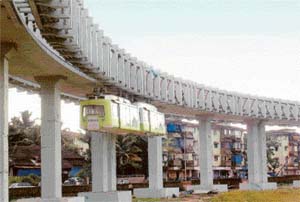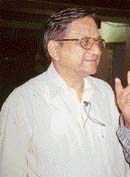|
Pie in the sky
The skybus, currently being test run in Goa, can revolutionise city travel. Prashant Sood gives an update on the brainchild of B. Rajaram of Konkan Railway.
|

Skybus on test track at Madgaon, Goa
|
All
it takes to move from the underground to the overhead is a bit of big
thinking. That’s what B Rajaram, Managing Director of Konkan Railway
Corporation, did and he came up with the skybus. The development
promises to transform urban travel adding a new, elevated level to
mass transportation which has already been redefined by the Metro. The
skybus may be the answer to all those traffic bottlenecks and
vehicular pollution that are a feature of our cities.
Konkan Railway’s
skybus technology, on trial in Madgoan, Goa, is awaiting the official
nod of Central authorities to proceed beyond at the 1.6-km test track.
|

B. Rajaram
|
The skybus is a modified
rail with overhead tracks on the underside of a concrete structure at
a height of about 10 metres from the ground. The concrete lane is
supported by columns rising from the central verge of existing roads.
The sleek 9.5-metre coaches can go up to 100 kmph. The scheme does not
envisage crossings as a traverser would be used to shift the sky
coaches from one track to another.
Rajaram, who has
conceived and developed the technology, says that in metros, skybus
can eliminate trucks as it is capable of carrying containers too. The
skybus is also free from risks of derailment. "The skybus would
run at a fourth of the cost of underground metro and half the cost of
an elevated metro," he says, adding that the risk of derailment
is almost nil.
The air-conditioned
travel in the skybus, with its wide windows, and gliding comfort,
could be superior to any other mode of city travel. The skybus coaches
being used for trials on 1.6 km test-track in Goa have been made by
the city’s small-scale industry. "Every part of the skybus is
made by small entrepreneurs. Ordinary men of our country are capable
of producing something for the world," Rajaram says.
The skybus does not need
long stations. Being an overhead system, the skybus metro does not
require huge land acquisitions for construction.
Rajaram says that only a
rail-based mass transit system over existing roads can solve problems
of urban congestion and pollution. "Roads cannot improve beyond a
point. When you have more fly-overs, the congestion gets transferred
to them." The capital on the skybus project, Rajaram maintains,
can be recovered in five to seven years after which residents of the
city are entitled to free travel after a one-time payment of Rs
15,000. "The skybus project is financially sustainable," he
asserts.
Several state
governments and cities in the country have evinced interest in skybus.
Konkan Railway has invited bids for technology licensing of the skybus
from private parties. The successful bidders will be required to take
up the projects on the finance build operate transfer (FBOT) basis.
They will be required to pay Rs 5 crore royalty per kilometre as
a one-time payment to the KRCL.
However, there is still
some way before the skybus becomes a reality. The Ministry of Urban
Development has constituted a high-level committee chaired by P V
Indiresan, former Director, IIT, Chennai, to look into the
techno-economic feasibility and safety of the skybus system. The
committee has on board senior officials from the CPWD, Ministry of
Railways, RDSO, RITES and CSIR besides the Commissioner, Railway
Safety.
Though Indiresan finds
parts of the skybus system interesting, he is not yet willing to make
an authoritative comment. "Every system will have its advantages
and disadvantages and every new concept faces some teething problems.
Though we want to support the skybus system in all possible ways, a
considered comment can be made only after proper evaluation," he
says. Other experts in the committee are yet to give their reports to
Indiresan. The final report is expected in about a month.
There is also the
question of which law will be applicable to the proposed mode of
travel as it does not entirely fit into the rules marked for tramway
or railways.
Not too happy with this
debate, Rajaram says that the country should get out of rule-based
system of the colonial period and make its own rules. "It is time
we made our own rules. In five years, we can make 20 Singapores,"
he says.
A "freak
accident" in September last year in which one person was killed
forced the KRCL to review its safety systems. "Seventy kilometres
of trial run has taken place. All safety norms have been
followed," Rajaram points out.
Initially, private
companies, including Tata and Jindals, showed keenness in the skybus
project by investing Rs 7 crore in the prototype. Later, the Railway
Ministry authorised KRCL to spend Rs 50 crore to put up the test
track. "Market exists in the world for financially viable urban
transport and the country stands to gain," he says.
Dedicated technologist
The
Managing Director of Konkan Railway Corporation Limited (KRCL), B
Rajaram, who will retire at the end of this month unless given an
extension by the government, presented the paper on the concept of
skybus at a world congress on railways in 1989.
An M Tech from IIT
Kaharagpur, Rajaram became Managing Director of the KRCL in 1997 after
serving the corporation in several critical posts during the
eight-year construction period of Konkan Railway. He presented the
skybus technology to the government in 2000-01. President APJ Abdul
Kalam, who was then Scientific Advisor to the Prime Minister, is among
the country’s top technocrats who found the skybus proposal
technically sound.
In total, 17
worldwide patents have been filed for various innovative technologies
assigned by B Rajaram to the KRCL. Three US patents (including the
skybus and self-stabilising track system) have been registered.
Rajaram has encouraged the KRCL employees to get karate training as
part of efforts to evolve a different security concept. The
Corporation has developed systems like networked anti-collision
device, railway software package and rolling stock health
analyst.
The KRCL hopes to
earn royalties of about Rs 10,000 crore over a business plan of Rs
1,00,000 crore.
After the
commissioning of Konkan Railway in 1998, a lot of technical staff
became redundant. Rajaram evolved a policy where the surplus staff was
trained for jobs like those of station master. No one was axed.
It is felt that
disturbing the present status of the KRCL and merging it with the
Railways may not augur well for the research being done by the
corporation. With the KRCL completing 15 years in July, the government
is to take a decision on the merger soon.
|